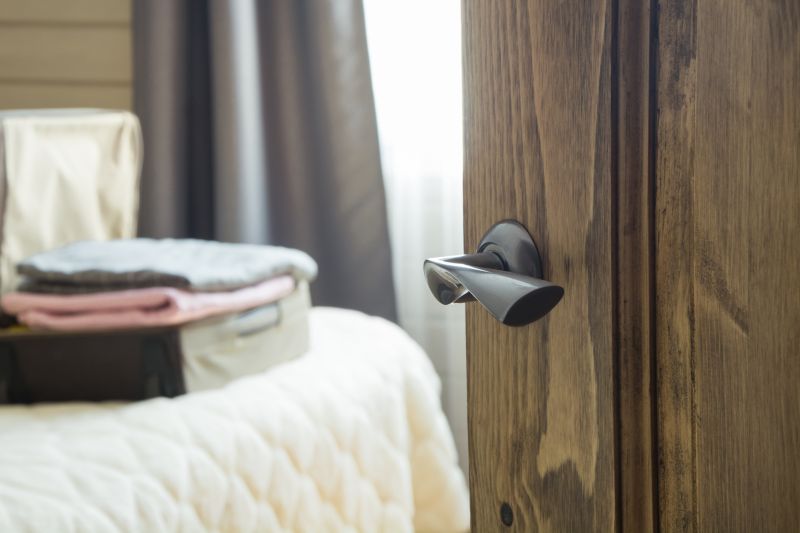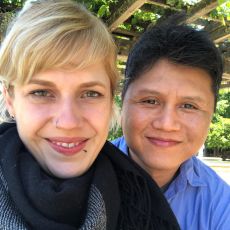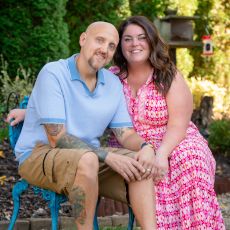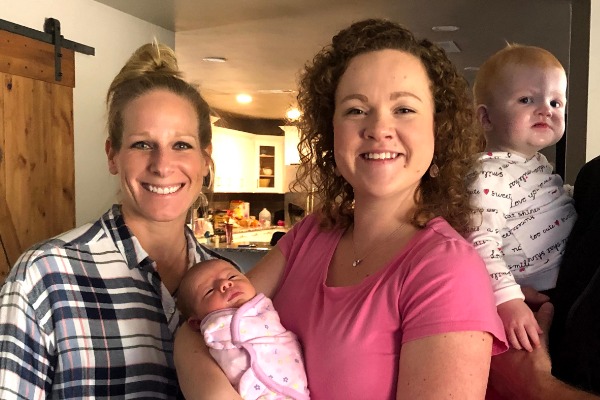5 Housing Options for Pregnant Women Considering Adoption
How Our Adoption Agency Helps with Housing
If you are pregnant, placing your baby for adoption, and need emergency housing, American Adoptions may be able to help. Contact us right now online or at 1-800-ADOPTION to get information.
Pregnancy is stressful. Choosing adoption for your baby is an even greater mental and emotional stressor. You shouldn’t have to worry about whether or not you’ll have a roof over your head on top of everything else. If you need help with birth mother housing, American Adoptions has two goals:
- We want to make sure that you’re safe, comfortable, and healthy during your pregnancy.
- We want to make sure that you’re living someplace that you can maintain. This means that you can continue to afford to live there long after the adoption, you’ll continue to feel safe there, and that this housing situation can help you “get back on your feet,” if that’s what you need right now. We want to be helpful for you long-term, not just a quick solution.
Whether you’re in an unstable or toxic home environment, or you’re experiencing homelessness, American Adoptions can assist with finding housing for pregnant women who want to “give baby up” for adoption. We can help you with housing throughout your pregnancy and adoption process, and make sure you can stay there long-term.
Housing options during adoption vary according to your level of need and the local and state laws where you live. American Adoptions can help you find the adoption housing options that suit your needs during your pregnancy and adoption process.
Some women want to continue living in their current home; others want or need to live somewhere else during their pregnancy. Regardless of your needs or preference, we can help you find the right housing options during adoption. If at any time you’d like to discuss any of these options further, you can always reach an adoption professional by filling out our online form or calling 1-800-ADOPTION to get more information.
Until then, read on to learn more about housing for mothers putting a child up for adoption. Let’s start with one of the most common questions:

“Do adoptive families house and pay your living expenses during the adoption process?”
It’s a common question from women considering adoption: “When you give a baby up for adoption, are the parents to your baby supposed to pay for your housing?”
There are several factors — including state laws and individual circumstances — that determine the types and amount of living expenses you can receive during your pregnancy and adoption plan. Generally, though, the answer is yes; in most cases, the adoption professional or adoptive parents can provide some sort of housing assistance to you. This may mean covering some or all of your rent, mortgage, utilities, or other costs during her pregnancy.
State laws also dictate how long after placement we can provide you with financial assistance for housing and other post-adoption supportive measures. Depending on your state laws, we may be able to help you with housing for up to four or six weeks after placement. Because our goal is to help get you established somewhere you can afford long-term, we hope that you’ll be able to continue living there without our assistance after we’re no longer able to provide you with financial support.
Below are the pros and cons of five different types of housing for mothers putting a child up for adoption.
Helpful Information
Option 1: Staying in Your Current Situation
This is a great option for many women who already have a safe, stable home environment. In this scenario, the adoptive family would pay (or partially pay) for your rent or mortgage wherever you currently live, whether that’s a home, apartment, duplex, trailer, etc. If you wish to stay in your current home, American Adoptions can help you make ends meet by covering expenses such as rent, utilities, or other necessary costs if you need help staying where you’re currently living.
Here are some pros and cons about Option 1:
- Pros: Staying in your current situation means you will not have to leave your community, job, school, or support system. You’ll be able to keep up with your familiar schedule and routine, like caring for your kids or other family members, or continuing school. Plus, you can continue to go to the doctor with whom you’re familiar and can deliver in a hospital you know. Often, the best housing for a pregnant woman considering adoption is the familiar home she already lives in.
- Cons: Your current home might not be a safe, stable, or supportive environment for you during your pregnancy or it could be far from where your support system lives. You might feel pressured to second-guess your adoption decision if people you live with (like your family or the birth father) are unsure or unsupportive of your adoption plan.
Women who stay in their current situation often have other children to care for and a great support system of family and friends they live with or near. These women also do not want to leave their doctor, community, job, or school, and they value controlling their schedule and routine.
However, if remaining in your current living situation during your adoption process is impossible or unsafe, there is other housing assistance for mothers adopting out their kids.
Option 2: Rental Property
If you don’t currently have stable housing, or if your current living situation is unsafe or unsupportive, an adoption professional may be able to help you to move into birth mother housing in an apartment, duplex, trailer, or other rental property. This housing, paid for by the adoptive family, will include part or all of your rent during your pregnancy.
If you are looking for adoption agencies that pay to relocate you, American Adoptions may be able to help you relocate to a rental property, like an apartment. We’d help with the deposit, turning on your utilities, or whatever we can do to help you get established. Our goal is to place you somewhere that you could continue to live in and afford after your pregnancy.
Here are some pros and cons for Option 2:
- Pros: Apartment living could be safer and more stable than where you live now and it can be found anywhere, so you would not have to leave your community, job, school, or support system. Apartment living may also allow you to maintain your privacy during your pregnancy and adoption.
- Cons: Some adoption agencies provide housing in the form of specific apartments that they own or promote. However, these apartments might not be as nice in person or a realistic living situation for you after the adoption. Make sure you work with a professional like American Adoptions that will help you find an apartment within your community that you feel comfortable in.
Women who might pick apartment living could feel unsafe or unsupported in their current living situation, yet do not want to leave their community, job, school, children, or support system.
Option 3: Maternity Centers or Homes
Maternity homes are living facilities that you move into during your pregnancy and adoption. They are often onsite at an adoption agency. Your room and board are covered by the adoption agency in this situation. Maternity centers can be religious or have certain types of requirements for your schedule, diet, education, curfew, and more.
American Adoptions is not an adoption agency that helps with housing in a maternity center, as we neither own nor operate a maternity home. However, we can help you find one if this is your preference.
Pros and cons of Option 3 include:
- Pros: Maternity centers sometimes have great amenities, and you’ll live with women who are in the same situation as you. Staff members may help get you to prenatal appointments, have a doctor and counselor onsite, or find temporary work for you during your pregnancy. Maternity centers can give you a sense of community because you’ll be living with women in the same situation as you. Especially if the maternity home is not in your city or community, you can maintain your privacy during your pregnancy and the adoption.
- Cons: The facility might not be as nice as the pictures and promotional materials lead you to believe, and unlike some other potential housing options during adoption, a maternity home will not become your permanent residence. Some women feel that the regulations on their diet, schedule, etc. are restrictive or do not find the local doctor appealing. Some women living in maternity centers feel pressured to place their baby or to convert to or practice the religion that a maternity home might be affiliated with because of all the assistance they receive.
Adoption agencies who help with housing in a maternity home might not be located near your home and they may have restrictions on who you can bring with you. This means you might have to leave your other children or support system behind. You may become homesick, lonely, or depressed if you are far from your family and friends or have to discontinue school during your pregnancy.
Women who might pick a maternity center are interested in living with women with whom they can identify. These women should be very sure of their decision and not easily swayed. These women may feel unsafe in their current living situation and don’t mind moving to temporarily live in a maternity home, even if it means leaving their community or support system behind or conforming to the beliefs of the maternity home.
Option 4: Short-Term Living
There are also options for temporary housing for pregnant women who want to “give a baby up” for adoption. These temporary options include hotels, extended-stay hotels, and motels. Your hotel fees would be partially or fully covered by the adoptive family you have chosen. American Adoptions can help you find short-term living in your hometown or a town closer to your support system if that is your need, but your adoption professional will also likely try to find you a more suitable long-term living situation you can continue to afford after the adoption.
Here are some pros and cons of Option 4:
- Pros: Short-term living can be found anywhere, so you would not have to leave your community, job, school, or support system. Short-term living could be safer and more stable than where you live now and could allow you to temporarily remove yourself from unsupportive people in your life while you determine what your next steps should be. You can maintain your privacy during your pregnancy and the adoption and can make your adoption decision without worrying about what others think.
- Cons: Short-term living can sometimes feel isolated and not cozy or homey. Moving into a hotel would be a short-term fix, but it would not help you get established in the long term.
Women who pick short-term living may feel unsafe or unsupported in their current living situation but do not want to leave their community, job, or support system. Sometimes, these women want to move closer to a support system or select short-term living because they chose adoption toward the end of their pregnancy. Often, short-term living is best for women who need a temporary solution while they try to find a more permanent living situation like an apartment, condo, home, duplex, trailer, etc.
Option 5: Moving in With a Supportive Friend or Family Member
If you’re in an environment that you feel is toxic, dangerous, or unsupportive of your adoption decision, you may try to seek out a friend or family member who is supportive of your adoption plan and who is willing to let you move in temporarily. American Adoptions can often pay for smaller expenses to help cover your cost of living during your pregnancy there, like your utilities or groceries, for example.
Pros and cons of Option 5 may include:
- Pros: You can be in an environment where you’re supported, encouraged, and loved. If this friend or family member is local, you may not have to relocate far. Your friend/family member may be able to help you locate a new living situation if you need to permanently remove yourself from your old housing.
- Cons: Staying with friends or family can sometimes strain your relationship with that person, especially if there isn’t much room or you’re staying rent-free.
This can be a good option for women who are living with someone (like their parents or a partner) who is unsupportive of their adoption plan. Moving in with a friend or family member may allow you to get out of an unsupportive or unhealthy situation and into a more supportive environment while you figure out what to do next.
No matter your situation, American Adoptions wants to help you find the adoption housing option that will best suit your needs during your pregnancy and adoption plan. To further discuss the pros and cons of birth mother housing options specific to your living situation, call an adoption professional at 1-800-ADOPTION or you can get free adoption information online.
Disclaimer: State, federal and local laws determine American Adoptions’ and an adoptive family’s ability to provide you with financial assistance and also determine how much financial assistance can be made available to you.
Disclaimer
Information available through these links is the sole property of the companies and organizations listed therein. American Adoptions provides this information as a courtesy and is in no way responsible for its content or accuracy.








































